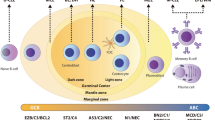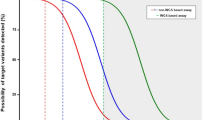Abstract
KRAS mutation status is routinely tested before the administration of chemotherapeutic agents that target EGFR such as cetuximab and panitumumab. Various commercial assays to analyze KRAS mutational status are currently certified for in vitro diagnostic use. However, the differences in the operational characteristics of the different assays have not been investigated. Since different assays could be different in specificity, sensitivity and precision, studies to clarify the best option for an adequate determination of KRAS mutation status are necessary. Until a gold standard for testing KRAS mutation status is established, the treating physician must interpret the results of any given assay keeping this limitation in mind.
Similar content being viewed by others
References
Jonker DJ, O’Callaghan CJ, Karapetis CS, Zalcberg JR, Tu D, Au HJ, Berry SR, Krahn M, Price T, Simes RJ et al (2007) Cetuximab for the treatment of colorectal cancer. N Engl J Med 357(20):2040–2048
Van Cutsem E, Siena S, Humblet Y, Canon JL, Maurel J, Bajetta E, Neyns B, Kotasek D, Santoro A, Scheithauer W et al (2008) An open-label, single-arm study assessing safety and efficacy of panitumumab in patients with metastatic colorectal cancer refractory to standard chemotherapy. Ann Oncol 19(1):92–98
Malumbres M, Barbacid M (2003) RAS oncogenes: the first 30 years. Nat Rev 3(6):459–465
Jancik S, Drabek J, Radzioch D, Hajduch M (2010) Clinical relevance of KRAS in human cancers. J Biomed Biotechnol 2010:150960
Schubbert S, Shannon K, Bollag G (2007) Hyperactive Ras in developmental disorders and cancer. Nat Rev 7(4):295–308
Amado RG, Wolf M, Peeters M, Van Cutsem E, Siena S, Freeman DJ, Juan T, Sikorski R, Suggs S, Radinsky R et al (2008) Wild-type KRAS is required for panitumumab efficacy in patients with metastatic colorectal cancer. J Clin Oncol 26(10):1626–1634
Herreros-Villanueva M, Rodrigo M, Claver M, Muniz P, Lastra E, Garcia-Giron C, Coma del Corral MJ (2010) KRAS, BRAF, EGFR and HER2 gene status in a Spanish population of colorectal cancer. Mol Biol Rep 38(2):1315–1320
Venook AP (2005) Epidermal growth factor receptor-targeted treatment for advanced colorectal carcinoma. Cancer 103(12):2435–2446
Kohne CH (2010) How to integrate molecular targeted agents in the continuum of care. Ann Oncol 21(Suppl 7):134–139
Richman SD, Seymour MT, Chambers P, Elliott F, Daly CL, Meade AM, Taylor G, Barrett JH, Quirke P (2009) KRAS and BRAF mutations in advanced colorectal cancer are associated with poor prognosis but do not preclude benefit from oxaliplatin or irinotecan: results from the MRC FOCUS trial. J Clin Oncol 27(35):5931–5937
de Bruijn MT, Raats DA, Hoogwater FJ, van Houdt WJ, Cameron K, Medema JP, Borel Rinkes IH, Kranenburg O (2010) Oncogenic KRAS sensitises colorectal tumour cells to chemotherapy by p53-dependent induction of Noxa. Br J Cancer 102(8):1254–1264
Ogino S, Kawasaki T, Brahmandam M, Yan L, Cantor M, Namgyal C, Mino-Kenudson M, Lauwers GY, Loda M, Fuchs CS (2005) Sensitive sequencing method for KRAS mutation detection by Pyrosequencing. J Mol Diagn 7(3):413–421
Marchetti A, Buttitta F, Pellegrini S, Chella A, Bertacca G, Filardo A, Tognoni V, Ferreli F, Signorini E, Angeletti CA et al (1996) Bronchioloalveolar lung carcinomas: K-ras mutations are constant events in the mucinous subtype. J Pathol 179(3):254–259
Do H, Krypuy M, Mitchell PL, Fox SB, Dobrovic A (2008) High resolution melting analysis for rapid and sensitive EGFR and KRAS mutation detection in formalin fixed paraffin embedded biopsies. BMC Cancer 8:142–156
Lleonart ME, Ramon y Cajal S, Groopman JD, Friesen MD (2004) Sensitive and specific detection of K-ras mutations in colon tumors by short oligonucleotide mass analysis. Nucleic Acids Res 32(5):e53
Lilleberg SL, Durocher J, Sanders C, Walters K, Culver K (2004) High sensitivity scanning of colorectal tumors and matched plasma DNA for mutations in APC, TP53, K-RAS, and BRAF genes with a novel DHPLC fluorescence detection platform. Ann NY Acad Sci 1022:250–256
Ausch C, Buxhofer-Ausch V, Oberkanins C, Holzer B, Minai-Pour M, Jahn S, Dandachi N, Zeillinger R, Kriegshauser G (2009) Sensitive detection of KRAS mutations in archived formalin-fixed paraffin-embedded tissue using mutant-enriched PCR and reverse-hybridization. J Mol Diagn 11(6):508–513
Kitano S, Nakayama M, Yamane A, Tsukahara Y, Amano M (2011) Detection of DNA mutations by fluorescence resonance energy transfer-based preferential homoduplex formation assay. Anal Biochem 408(2):197–205
Nollau P, Wagener C (1997) Methods for detection of point mutations: performance and quality assessment. the IFCC Scientific Division, Committee on Molecular Biology Techniques. J Int Fed Clin Chem 9(4):162–170
Haliassos A, Chomel JC, Grandjouan S, Kruh J, Kaplan JC, Kitzis A (1989) Detection of minority point mutations by modified PCR technique: a new approach for a sensitive diagnosis of tumor-progression markers. Nucleic Acids Res 17(20):8093–8099
Jiang W, Kahn SM, Guillem JG, Lu SH, Weinstein IB (1989) Rapid detection of ras oncogenes in human tumors: applications to colon, esophageal, and gastric cancer. Oncogene 4(7):923–928
Levi S, Urbano-Ispizua A, Gill R, Thomas DM, Gilbertson J, Foster C, Marshall CJ (1991) Multiple K-ras codon 12 mutations in cholangiocarcinomas demonstrated with a sensitive polymerase chain reaction technique. Cancer Res 51(13):3497–3502
Ahmadian A, Ehn M, Hober S (2006) Pyrosequencing: history, biochemistry and future. Clin Chim Acta 363(1–2):83–94
Poehlmann A, Kuester D, Meyer F, Lippert H, Roessner A, Schneider-Stock R (2007) K-ras mutation detection in colorectal cancer using the Pyrosequencing technique. Pathol Res Pract 203(7):489–497
Newton CR, Graham A, Heptinstall LE, Powell SJ, Summers C, Kalsheker N, Smith JC, Markham AF (1989) Analysis of any point mutation in DNA. The amplification refractory mutation system (ARMS). Nucleic Acids Res 17(7):2503–2516
Clayton SJ, Scott FM, Walker J, Callaghan K, Haque K, Liloglou T, Xinarianos G, Shawcross S, Ceuppens P, Field JK et al (2000) K-ras point mutation detection in lung cancer: comparison of two approaches to somatic mutation detection using ARMS allele-specific amplification. Clin Chem 46(12):1929–1938
Whitcombe D, Theaker J, Guy SP, Brown T, Little S (1999) Detection of PCR products using self-probing amplicons and fluorescence. Nat Biotechnol 17(8):804–807
Thelwell N, Millington S, Solinas A, Booth J, Brown T (2000) Mode of action and application of Scorpion primers to mutation detection. Nucleic Acids Res 28(19):3752–3761
Oliner K, Juan T, Suggs S, Wolf M, Sarosi I, Freeman DJ, Gyuris T, Baron W, Bakker A, Parker A et al (2010) A comparability study of 5 commercial KRAS tests. Diagn Pathol 5:23–30
Acknowledgments
Thank to Oncology, Pathology and Research Unit in General Yagüe Hospital in Burgos, Spain. MHV is especially thankful to CVP, IHH and AHV, for their support.
Conflict of interest
None.
Author information
Authors and Affiliations
Corresponding author
Rights and permissions
About this article
Cite this article
Herreros-Villanueva, M., Aggarwal, G. KRAS assay selection: sensitivity and accuracy in clinical application. Mol Biol Rep 39, 2467–2470 (2012). https://doi.org/10.1007/s11033-011-0997-6
Received:
Accepted:
Published:
Issue Date:
DOI: https://doi.org/10.1007/s11033-011-0997-6




